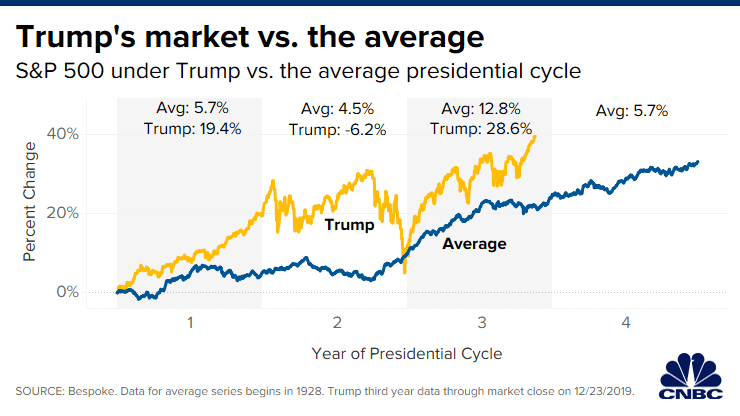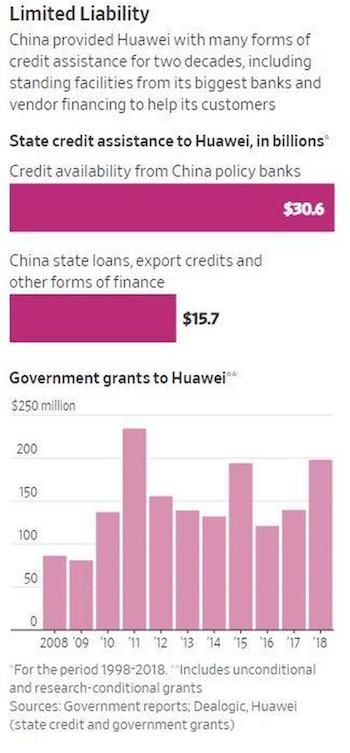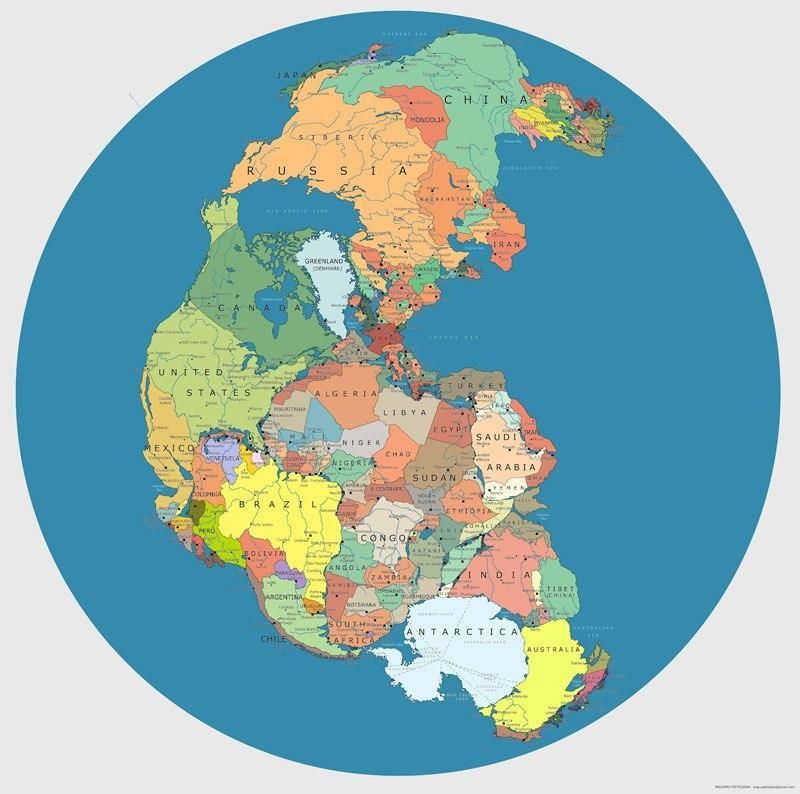
Alfred Palmer Women as engine mechanics, Douglas Aircraft, Long Beach, CA 1942

Bill Barr going after Big Tech? Let’s wait and see…
Democratic Senator Elizabeth Warren has made breaking up tech giants a plank for her bid to win the U.S. presidency. But chances are Team Trump will steal her thunder. One of the few things Democrats and Republicans agree upon is that Silicon Valley firms have gotten too big. Warren wants to send Amazon to the chopping block, arguing Jeff Bezos’s online-shopping colossus shouldn’t be allowed to both run a marketplace and sell its own stuff on it. She ran a fake political message on Facebook. It claimed founder Mark Zuckerberg was backing President Donald Trump for re-election to prove a point that the social-media network has an obligation to fact-check campaign-related advertising.
Across the aisle, Republican Senator Josh Hawley has sponsored several pieces of legislation including a “Do Not Track” bill that is backed by Democrats. The Trump Administration is likely to strike first. It has already been laying some groundwork, including by the tweeter-in-chief himself. In November Trump blasted out a message accusing Alphabet’s Google of suppressing votes by limiting the targeting capabilities of political contenders. The president’s top trustbuster launched a probe in July into whether the sheer size of market-leading online platforms has stifled innovation and reduced competition. Although unnamed, it’s clear Attorney General William Barr is targeting Amazon, Alphabet and Facebook.
He also over the summer appointed his own antitrust adviser. It’s an unusual move: The agency already has a division dedicated to the issue, headed by Makan Delrahim. He, though, had been more skeptical about Big Tech and anti-competitive concerns, before starting to change his tune around a year ago. Barr has also been a good Trump soldier. He has been critical of Special Counsel Robert Mueller’s probe of Russian interference in the 2016 U.S. election and the Trump campaign’s potential involvement – and launched his own investigation into the origins of that case, which the president has demanded.

“In 1999, the Democrat from New York famously opposed witnesses in the trial of President Clinton as nothing more than “political theater.” Now Schumer has declared that witnesses and a full trial are essential for President Trump..”
• The Democrats May Prove The Greatest Barrier To A Full Trial (Turley)
When William Shakespeare wrote that “all the world is a stage” and “one man in his time plays many parts,” he could have probably had in mind Senator Charles Schumer. In 1999, the Democrat from New York famously opposed witnesses in the trial of President Clinton as nothing more than “political theater.” Now Schumer has declared that witnesses and a full trial are essential for President Trump, and that a trial without witnesses would be deemed the “most unfair impeachment trial in modern history.” That does not include the Clinton case where Schumer sought to proceed to a summary vote without a trial. As the Senate now gears up for the third presidential impeachment in history, the fight has begun over the rules and scope of a trial.
The Framers were silent on the expected procedures and evidence for a trial, beyond the requirement of a two-thirds vote to convict a president. The only direct precedent on these issues is derived from two very different trials, those of President Johnson and Clinton. By sending a thin record to the Senate, the House could not have made things easier for Trump. Since the House did not take time to subpoena critical witnesses, such as former national security adviser John Bolton, or to compel testimony of other witnesses, the Senate could simply declare that it will try the case on the record supplied by the House, a record that Democrats insist is already conclusive and overwhelming. Moreover, in reviewing the past trials of Johnson and Clinton, Democrats may have to struggle with precedents of their own making.
Indeed, Republicans could argue that a trial without witnesses is impeachment in Democratic style. The first question for the trial could be whether there should even be a trial held at all. In early England, the House of Lords often refused to hold trials on impeachments, which often were raw political exercises. In the Clinton trial, Democrats moved to dismiss both impeachment articles as meritless. The motion by Senator Robert Byrd failed on a largely party line vote with Democrats, including Senator Joe Biden, Senator Dianne Feinstein, and Schumer, opposing having any impeachment trial at all.

It’s not a stock market rally.. It’s a Fed rally.
• Trump Stock Market Rally Is Far Outpacing Past US Presidents (CNBC)
President Donald Trump’s stock market stacks up well against the majority of his presidential predecessors. The S&P 500 has returned more than 50% since Trump was elected, more than double the 23% average market return of presidents three years into their term, according to data from Bespoke Investment Group dating to 1928. The bellwether index gained more than 28% this year, well above the average 12.8% return of year three for past U.S. presidents. “Year three has been by far the best year of the cycle with an average gain of 12.81%, and the playbook has stuck to the script in year three of the current cycle,” the firm said in a note to clients last month.

Despite the volatility from the U.S.-China trade war, 2019 has been a year of all-time highs for the major stock averages. The S&P 500 crossed 3,200 for the first time ever last week, hitting its seventh round-number milestone of 2019. While business investment slumped due to uncertainty surrounding the world’s two largest economies, public market investors remained confident enough to put money into stocks. Trump’s market got a boost from Federal Reserve Chair Jerome Powell and the central bank, which lowered interest rates three times this year, the first time since the end of the financial crisis. The Fed slashed rates on fears of slowing growth at home and abroad. Trump was highly critical of Powell for not lowering rates more and faster, often mentioning the near $15 trillion in negative yielding government securities outside the U.S.

This is where that Trump rally comes from. Very close to what I’ve been writing about central banks. “There is no means of avoiding the final collapse of a boom brought about by credit expansion.”
• Today’s Central Bankers Threaten Civilization (Mises)
Let us begin with a basic question, that lies at the heart of this issue: Who profits from a loan that is guaranteed to pay back less than the amount borrowed? Obviously, it is the borrower and not the lender, which in our case is the government and those closely connected to it. Negative rates and negative-yielding bonds by definition favor the debtors and punish the savers. In addition, these policies are an affront to basic economic principles and to common sense too. They contradict all logical ideas about how money works and they have no basis and no precedent in any organic economic system. Thus, now, in addition to the hidden tax that is inflation, we also have another mechanism that redistributes wealth from the average citizen to those at the top of the pyramid.
Thus, this very concept of a central authority being able to bend and twist the rules, even when the result is illogical, has implications that extend way beyond daily economic activities. In fact, it ultimately divides society into two classes, those who profit from this arbitrary and unilateral rewriting of the rules and those who are forced to pay the price even though they never agreed to it. In fact, they weren’t even asked. Of course, we can also look at it from the collective perspective of the so-called social contract of Rousseau and argue that this system of overt (taxation) and covert (monetary policy) redistribution is legitimate, or even benign. You might still believe that the state will take care of you in the future, and thus you are willing to sacrifice a part of your wealth and savings today to make sure that happens.
In that case, it is useful to remember that the current central banking system is not that old. It’s only been around for about hundred years, or two long-term debt cycles combined. The first cycle ended when President Nixon officially tried to demonetize gold in 1971, empowering a centralized system whereby a few decide who receives the currency first and at what interest rate, allowing them to create bubbles in certain asset classes, protect different key industries and to use it to finance wars and enrich politicians and those close to them. So far, total credit on a global scale stands around $240 trillion. It’s hard to conceive of such a number, but if you consider that 1 trillion seconds are equal to 31,709 years, you might begin to wrap your head around just how leveraged the system has become.
We should never forget that debt is always consumption brought forward. That being said, debts need to be paid back or forgiven — there is no other outcome. In addition, the amount of debt that a system can take on is limited, and when a credit-based system can’t grow any further, the logical outcome is the collapse of the whole system. As Ludwig von Mises described this a long time ago, “There is no means of avoiding the final collapse of a boom brought about by credit expansion. The alternative is only whether the crisis should come sooner as the result of a voluntary abandonment of further credit expansion, or later as a final and total catastrophe of the currency system involved.”

Just the fact that she still has a job says enough.
• Rachel Maddow Called Out For Shamelessly Peddling Fake News (ZH)
Conspiracy theorist and MSNBC host Rachel Maddow has been called out by Washington Post columnist Erik Wemple for breathlessly peddling the Steele Dossier – becoming a “clearinghouse” for the largely debunked opposition research funded by the Hillary Clinton campaign and the DNC in 2016 (and fed to the MSM six weeks before the 2016 US election by the former British spy who wrote it). Wemple has been writing about the media’s coverage of the Steele dossier since it was significantly undercut earlier this month by Michael Horowitz, the DOJ Inspector General. Thursday’s feature details how Maddow spewed Russophobic propaganda to the American public based on Steele’s fabricated claims.
Horowitz absolutely shredded the dossier, writing in his report on FBI FISA abuse that “The FBI concluded, among other things, that although consistent with known efforts by Russia to interfere in the 2016 U.S. elections, much of the material in the Steele election reports, including allegations about Donald Trump and members of the Trump campaign relied upon in the Carter Page FISA applications, could not be corroborated; that certain allegations were inaccurate or inconsistent with information gathered by the Crossfire Hurricane team; and that the limited information that was corroborated related to time, location and title information, much of which was publicly available.”
Maddow began using the dossier to smear Trump in March of 2017 – when both CNN and the New Yorker falsely claimed that US authorities had loosely confirmed ‘some of the details’ from the dossier. An emboldened Maddow claimed that while the “baseline” dossier claim that Trump colluded with Russia to win the 2016 election had yet to be proven, “all the supporting details are checking out, even the really outrageous ones. A lot of them are starting to bear out under scrutiny. It seems like a new one each passing day.” Based on the conclusions reached by both the FBI and DOJ Inspector General Michael Horowitz, Maddow was peddling conspiracy theories.
“When small bits of news arose in favor of the dossier, the franchise MSNBC host pumped air into them,” writes Wemple. “At least some of her many fans surely came away from her broadcasts thinking the dossier was a serious piece of investigative research, not the flimflam, quick-twitch game of telephone outlined in the Horowitz report.” “She seemed to be rooting for the document.”

Makes sense for Xi.
• Huawei Benefited From Billions Of Dollars In State Support (ZH)
The Wall Street Journal continued its string of reports on the Chinese government’s shadowy campaign to support mission-critical companies in the private sector on Christmas Day by exposing for the first time to totality of government support for Huawei. Billions of dollars in credit facilities backed by state-controlled “policy banks”, coupled with pro-business tax breaks, allowed Huawei to cement its position as the world’s leading telecoms giant, according to WSJ. Huawei’s grants, credit facilities, tax breaks and other forms of financial assistance details for the first time how Huawei had access to as much as $75 billion in state support as it grew from a little-known vendor of phone switches to the world’s largest telecom-equipment company—helping Huawei offer generous financing terms and undercut rivals’ prices by some 30%, analysts and customers say.
Around the world, Huawei is vying to build next-generation 5G telecom networks, much to Washington’s chagrin. In a well-documented campaign, the US has struggled to convince it allies to exclude Huawei equipment from their 5G infrastructure, claiming that Huawei parts would compromise security and allow the Chinese government to tap into civilian and military communications. But thanks in part to all of this government support, Huawei is able to offer telecoms equipment at world-beating prices. Its biggest competitors, Nokia and Ericsson, can’t even come close. This government support also undermines Huawei’s claims that it operates independent of Beijing, and that it would under no circumstances cooperate with state intelligence against its customers.
Nevermind that multiple investigations have uncovered evidence that Huawei builds backdoors into its equipment to allow easy access by Chinese intelligence forces. It’s important to remember that Huawei’s commercial interests align with those of the Chinese government in more ways than one. “While Huawei has commercial interests, those commercial interests are strongly supported by the state,” said Michael Wessel, a member of a U.S. congressional panel that reviews U.S.-China relations, in an interview. The U.S. has raised concerns that use of Huawei’s equipment could pose a security risk, should Beijing request network data from the company. Huawei says it would never hand such data to the government.


Divide and rule.
• China Threatens EU With “Disastrous” Consequences Of Company Curbs (ZH)
Less than two weeks after Beijing issued an overt threat at Germany, when Chinese ambassador to Germany Ken Wu told ex-Foreign Minister Sigmar Gabriel that if Germany excludes Huawei 5G from its communication networks, then China could “declare German cars unsafe” for its domestic market, effectively giving Angela Merkel a quid-pro-quo ultimatum that a ban of Huawei – as demanded by the Trump administration – would lead to retaliation against German auto exports, Beijing’s ambassador to the EU, Zhang Ming, doubled down and warned the bloc against pursuing policies to curb Chinese companies’ access to Europe, saying it would damage its own interests and deter investment.
The ambassador, a veteran diplomat and previously a senior foreign ministry official in Beijing, said plans to clamp down on foreign corporate ownership, trade opportunities and 5G mobile communications technology threatened to trigger a backlash from “suspicious” Chinese entrepreneurs. Ming added that EU countries needed to promote international co-operation and free markets, by which of course he meant free markets that suit China. “Otherwise, it’s disastrous for them,” he warned in an interview with the FT. “What I hope to see is that the EU will keep to the principles of multilateralism and free trade, as well as the principles of openness, fairness, justice and non-discrimination.”
Zhang said the hardening attitude on the EU side had made “many Chinese entrepreneurs working in Europe suspicious” and “also had some kind of impact on Chinese investment in the EU.” “My colleagues and I are strongly committed to promoting China–EU co-operation, so I’m following the development with interest and concerns,” said the envoy who was a former vice-minister of foreign affairs and took his current post in Brussels in 2017. “Capital is very sensitive, and even cowardly in some cases. In case of any changes or developments, they will feel highly vigilant or even be scared away”

Oh, sure. Because rain is so rare in the UK. People just stay home and wait for the usual balmy weather to set in again.
• Rain Keeps UK Boxing Day Shoppers At Home (R.)
UK shoppers sheltered at home on Thursday, with the numbers hitting post-Christmas sales set to drop significantly for a fourth year in a row, initial data showed. Footfall up to 12 p.m. on Dec. 26, known in Britain as Boxing Day and a key date for retailers, was down 10.6% compared with the same period a year ago, market research company Springboard said, adding that bad weather had deterred shoppers. High streets were most affected by the rainy weather with consumers reluctant to go out in the morning, Springboard said. Black Friday sales in November and a growing number of people shopping online have reduced Boxing Day footfall in recent years. “Boxing Day is indisputably a less important trading day than it once was,” said Diane Wehrle, Insights Director at Springboard, adding that the Boxing Day footfall was 10.9% lower than during Black Friday morning.

A 2-second cameo in a 27-year old movie. Tons of publicity.
“Trump’s repeated cameos were down to a contractual clause ensuring he appear on-camera if a production filmed in one of his buildings.”
• Trump Says Home Alone 2 ‘Will Never Be The Same’ (Ind.)
Donald Trump has said Home Alone 2 “will never be the same” after his cameo was cut from the film by a Canadian TV broadcaster. When he was a real estate mogul and New York celebrity, Trump briefly appeared as himself in 1992’s Home Alone 2: Lost in New York, offering travel advice to Macaulay Culkin’s character. But the scene was missing from the film when it was broadcast on Canada’s CBC Television this week, leading a spokesperson having to deny that it was cut for political reasons. “As is often the case with features adapted for television, Home Alone 2 was edited to allow for commercial time within the format,” a representative said. On Twitter, Trump addressed the missing scene furore, and joked that Canadian prime minister Justin Trudeau may have been to blame.
“The movie will never be the same! (just kidding),” he tweeted. “I guess Justin T doesn’t much like my making him pay up on Nato or trade!” On Christmas Eve, Trump boasted that “young kids” always reference his Home Alone cameo to him. “It turned out to be a very big hit, obviously,” he said during a conference call to US troops overseas. “It’s a big Christmas hit – one of the biggest. So it’s an honour to be involved in something like that.” Trump made a number of cameos in films and television series throughout the 1990s. Speaking in 2017, Matt Damon explained that Trump’s repeated cameos were down to a contractual clause ensuring he appear on-camera if a production filmed in one of his buildings.

Pangaea with modern-day international borders


Please put the Automatic Earth on your 2020 charity list. Support us on Paypal and Patreon.
Top of the page, left and right sidebars. Thank you.








Home › Forums › Debt Rattle December 27 2019